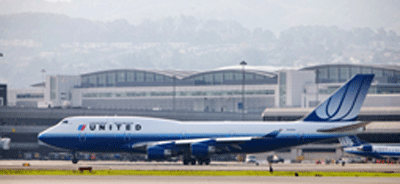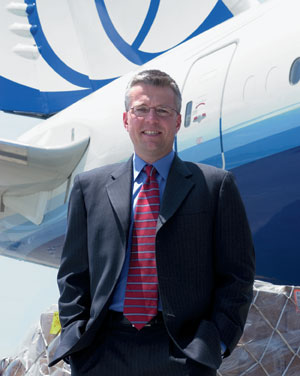Dolan
Gets Upped—Talks About Change
  Scott
Dolan Senior Vice-President- Cargo at United Airlines Worldwide Cargo
joined the airline in 2004 from Atlas Worldwide Holdings, where he served
as senior vice president and chief operating officer responsible for the
day-to-day operations for both Atlas Air and Polar Cargo. Scott
Dolan Senior Vice-President- Cargo at United Airlines Worldwide Cargo
joined the airline in 2004 from Atlas Worldwide Holdings, where he served
as senior vice president and chief operating officer responsible for the
day-to-day operations for both Atlas Air and Polar Cargo.
During a time at UAL that can now be described
as “the dark days” when the second biggest airline in the
world spun out of financial control, approaching the abyss of possible
insolvency and even liquidation, Mr. Dolan brought a firm yet steady hand
to the cargo controls.
Now a couple of years later United is showing
real spark having taken down monumental costs during what will be remembered
as one of the longest bankruptcies in American corporate history.
All through this time Dolan who has plenty
of heavy duty credentials in his business training and practical experience,
went about the job of reforming United Cargo from the ground up including
one move to outsource cargo terminal handling that initially at least
was a real nightmare all around, for both customers and airline alike.
But just like April showers and May flowers,
or the warbling of that song saying that the sun will come out tomorrow,
United Cargo in 2006 has affected an enormous turnaround.
But Scott Dolan who says “we are still
not done” has also emerged not as a fireman or as an emergency turnaround
business artist, but rather as the poster image for an archetypical 21st
century air cargo business executive, who has not only created a new template
for United Cargo, but also has been further tapped by the airline to multi-task,
spreading the magic to other parts of the carrier.
Earlier this month Scott was named to command
the unit that consolidates airport operations and the cargo division into
one organization
“Consolidating airport operations
and cargo under Scott’s leadership will further streamline United’s
operations, drive efficiencies and produce additional cost savings,”
Pete McDonald, United executive vice president and chief operating officer
said.
“Scott has made a significant impact
in the last two years, growing cargo revenue, and improving customer service
while greatly reducing costs.
“We look forward to him bringing his
energy and rigor and key international experience, having run United Cargo
Worldwide, to this new position.”
Also earlier this month as keynote speaker
at the big CNS Partnership Conference in Las Vegas Mr. Dolan discussed
air cargo industry networking as part of a keynote address (reported here
FT May 3).
Here Mr. Dolan moves thorough the process
that changed United Cargo.
“Cargo was formerly
viewed as what I like to call "gravy revenue" for United Airlines.
Now, after restructuring every level of the business, it is a core business
for the company.
It was not an easy road, but we examined
all parts of the business and made changes at every level to get competitive.
We restructured the business.
One of the keys to our restructuring was
developing a performance-based management culture—centered on accountability,
pay-for-performance, metrics and execution.
United Cargo created a separate P&L
(profit and loss statement) focused on maximizing cargo's contribution
to the company, to better align employee goals with the goals of the cargo
business.
Now, 50 percent of every cargo employee’s
end of year bonus and 33% of their quarterly bonus is tied to "cargo-managed
contribution," while the other percentages are tied to corporate
goals.
Ambiguity about divisional goals has been
eliminated.
We are now prioritizing all divisional resources
to focus on initiatives that drive our contribution, and eliminating activities
that do not.
For our sales force, we went one step further,
developing a sales compensation program that rewarded salespeople for
being "hunters" rather than "farmers," by creating
a pay-for-performance culture based on individual performance.
United had to turn over a significant portion
of the sales force, roughly 50 percent of those involved in the program,
to be able to thrive in this “hunter” environment.
Our sales people are now serving customers
24-7 rather than 9-to-5.
The more robust analytics of our revenue
management organization—focused on load and yield maximization on
our “A” lanes and traffic-generation initiatives on our B
and C lanes—are also helping to steer the efforts of our sales force.
In fact, we have tailored our sales compensation
program to focus on improving contribution, while providing additional
bonuses to help fill B and C lanes.
In addition to the sales compensation program,
we restructured our sales force with a more global perspective.
In 2003, we geared our sales structure toward
our strategic customers—the large multinationals who drive business
in most every corner of the world.
We developed a strategic account team to
focus on the needs of this customer group, and restructured our regional
sales approach to tailor our sales coverage and customer service to this
group of customers.
United Cargo sharpened focus on the customer.
We began to examine the needs of our customers at every level—global,
regional and local—and started to work to better understand what
they are looking for in a cargo carrier.
In addition we set up our internal operating
metrics to mirror how they measure us.
Cargo focused on maximizing revenue:
Additionally we also deliberately worked
to improve our understanding of the worth of our network. This meant examining
strong lanes, weak lanes and understanding patterns where we can work
with partners to help each other maximize business and revenue.
In August 2005, we instituted phase one
of Cargo Max, a Sabre product for inventory management.
The product is based on winds, passenger
loads, bags and no-show rates, among other indicators, and helps us best
understand how much to sell on any given flight.
United solved the issue of strategic customers'
network value vs. key point of sale value by recognizing the network value
provided by our strategic customers with space allotment and boarding
preference on our highest demand flights.
Moves have been also been implemented to
provide higher overall customer service, and a focused strategic sales
effort here.
We cut costs.
Outsourcing warehouses reduced costs tremendously.
In June 2003, began United Cargo outsourcing
of our largest domestic warehouses—including those at our hubs.
This was an initiative that not only saved
about 80 million dollars annually, but also enabled us to significantly
improve service to our customers by implementing more robust metrics and
tough service-level agreements with our vendors.
I have to admit; we had a rough start in
the first year because we did not do the work necessary to be successful.
You need to have documented processes, metrics,
SLAs and a reward & penalty system in place.
However, we had a traditional arms-length
vendor-client relationship, where feedback on service was based heavily
on crisis management and anecdotal failures with our most vocal customers
and sales people.
To remedy the situation, we implemented
SLAs and backed them up with robust, key-performance metrics developed
by our six-sigma quality group.
In terms of quality United Cargo is now
above where it was before outsourcing.
We are also integrating our volume planning
with our vendor's manpower planning, and doing joint studies to determine
optimal staffing levels to improve service.
United Worldwide Cargo today has created
a more robust SLA with our warehouse handlers and will provide significant
incentives for step improvements in staging, buildup, recovery, mail scanning
and data integrity, among other things.
Again, we are truly aligning their incentives
with ours.
The vendor-client relationship is now an
integrated and evolved one, where we are actually partnering with our
vendors to drive results.
While revenue is where most of the leverage
exists in the cargo business, we cannot and will not lose focus of the
cost side.
Outsourcing our warehouses, we continue
to drive cost out of the business by outsourcing our call centers, while
leaning out our general and administrative staff.
Our staff constantly analyzes the need for
any given function, and looks for ways to consolidate, eliminate or automate
work.
United Cargo has gone from 2,700 employees
in 2003 around 350 now.
As part of our restructuring, we also reduced
wages and benefits for the remaining personnel significantly.
This is especially important in our labor
groups that don’t reside in the cargo division, but their costs
are taken into consideration in our fully loaded contribution.
We are also focusing on trucking, container
logistics, corporate travel, advertising spend and ground handling costs
to ensure cost efficiency at every level of the business.
Perhaps most importantly, United has instilled
accountability for quality:
As we mentioned before, we have developed
a Six-Sigma quality organization that develops metrics, does root-cause
analysis and works with the various organizations that interact with cargo,
all in the name of driving improved results for the business. When I started,
we did not have very good operational information, and reasons for failure
were fairly speculative and anecdotal. We instilled discipline to this
process to the point that now there is within our organization a rigorous
process that includes weekly calls between cargo operations, our vendors
and airport operations to examine key metrics, understand root causes
of failures and successes and, overall, drive results.
This process helps to hold everyone accountable
for delivering on the goals set out for ourselves.
Monthly performance has gradually improved
since we began instilling the Six Sigma system.
United Airlines Worldwide Cargo performance
is now at its highest level ever.
All of these initiatives enabled us to make
tremendous progress towards our goal of becoming a competitive business
that not only contributes significantly to the bottom line of United Airlines,
but also serves as a serious competitor in the cargo industry.
Over the last two years we have grown revenues
from 610MM to 730MM but more importantly we have nearly doubled the fully
loaded contribution, i.e., profit, to the corporation.
While I am pleased with the results there
is still more we can do, and we are committed to improving.”
(Geoffrey Arend)
|



